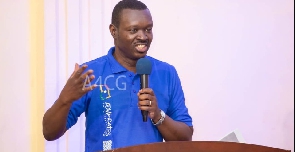THE PARLIAMENTARY Committee on Education, chaired by Hon James Adusei-Sarkodie, last Tuesday visited some private universities in the country to acquaint themselves with current development there.
Among the universities visited were the Methodist University College Ghana (MUCG) in Dansoman and the Islamic University College Ghana (IUGG) in East Legon.
At the MUCG, the principal of the university, Prof Nathaniel Kofi Pecku, told the committee members that the Methodist Conference took the decision to put up the college some years back, and in 2000, the building was up.
However, there were two schools of thought on starting the university. He said whereas one school held that all the infrustracture should be accomplished before it was started, the other contended that the university could be started with the basic infrastructure in place.
According to Prof Pecku, in 2000, the college was started with the basic infrastructure in place, and in 2001 the second batch of students was admitted.
The principal observed that currently there are 438 students for two faculties and stressed that the college is doing a three-year course for “A” Level holders and diploma holders from the polytechnics and post-secondary colleges, while SSS candidates do four-year courses.
The principal stated that the college is non-residential, but the church intends putting up hostels for the students.
Prof Pecku emphasised that the college which will be a multi-campus institution, intends to set up campuses throughout the country to house different faculties.
These campuses, he avowed, will be set up in Accra, Bonwire, Dawhyenya, Ejura and Koforidua. Others will be in Kumasi, Larteh, Techiman and Wenchi.
He went on to say that MUGG is in the process of seeking affiliation to the University of Ghana, Legon, to enable it award degrees authenticated by Legon.
He assured the committee that the admission criteria for the college are the same as those for all other universities in the country, and that no religious considerations hold sway.
On funding, the principal disclosed that it comes from the church and school fees with little drippings from outside the country.
He said students pay ?2.8 million for the first semester and ?2.4 million for the second semester. This, he revealed, cannot be met by a number of students.
Prof Pecku noted that currently the college has no scholarship schemes for students, but will consider one in future.
The college, he sounded, has 12 fulltime experienced lecturers and 14 part-time ones. He maintained that the college was very particular about inculcating good moral principles in the students, so that they do not pass out as educated barbarians.
At the IUCG, the president of the college, Dr A.M. Hakim Elahi and the registrar, Alhaji R. Gbadamosi, briefed members of the committee about developments there.
They said the college infrastructure was started in 1995 and completed in 2000, and that they had applied for accreditation.
They noted that in February 2001, the student membership was 14 which later rose to 41 in 2002, and these include five Sierra Leonians, eight women and two Methodist pastors.
According to the college authorities, the college does not discriminate along religious, ethnic or racial lines in admitting students.
They held the view that admission criteria are the same as done in other universities in the country.
Alhaji Gbadamosi intoned that being the only private university south of the Sahara, it is the intention of the college authorities to make it very attractive by including many programmes.
He affirmed that the college has large rooms for classes and also, these are all the facilities needed for learning.
According to Alhaji Gbadamosi, the initial aim of the college was to provide education for the under-privileged, including Muslims.
He again disclosed that being funded by an NGO from Iran, the college has no problems with funding.
He went on to say that initially, the college decided to offer free tuition to students. However, in order that they might have value for education there, the students were required to pay ?4.8 million for the whole year, because it is a non-profit making institution.
Alhaji said the school is affiliated to the University of Ghana and has seven tutors and many faculties, including Administration, Banking and Business.
Alhaji Gbadamosi went on to say that the varsity intends to take on 60 more students soon.
However, this would not be done in a rush, because as a private university, it believes in quality and not quantity. He stated that the first batch of graduates will come out in 2004.
After all said and done, the registrar cut in to say that there was no telephone communication in the school, as the extension of the facility had not reached the area yet.
The committee congratulated the authorities of the two universities for setting them up, and assured them of Parliament’s support, since the progress of the institutions was also the harbinger of the progress of the nation.
General News of Tuesday, 23 July 2002
Source: gna
















